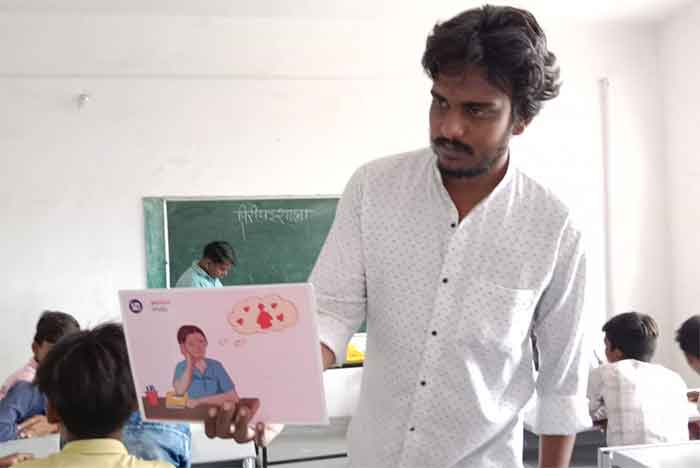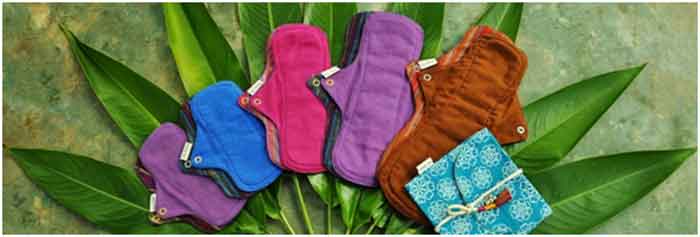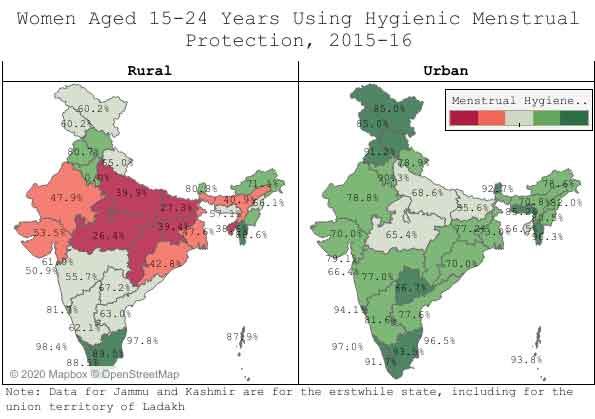
It was April and we were all getting ready for parents-teacher meeting in my daughter’s school, when I noticed her inner wear were smeared with red stains. She would turn ten the next month, so she wasn’t ten yet and she had started menstruating already. Her paediatrician later told me that this is natural nowadays.
I was so unprepared as a mother that I didn’t know what to tell her. But she had seen sanitary napkins in my closet before and I had assured her that I will explain their use in a few years. So it was a little easy for me to say that she needed to use one of those and I will tell her everything once we get back from the meeting in her school.
Thankfully one of her friends’ mothers, with whom I shared this, said that her daughter started her periods from last month. I remember I felt so disturbed that my daughter would have to put up with this monthly hassle from such a young age that this was the firs thing I told her teacher when I met her for the meeting.
Nowadays they have “Counselling” classes where they talk about menarche and some of the myths surrounding it, but most of the times my daughter comes back and tells me, she hasn’t understood most of it. And many of the students have already had menarche by the time counselling even started.
Somehow I used to feel very uneasy about seeing her keep her fallen tooth under the pillow for tooth fairy and write letters to Santa on Christmas for dolls, and also having to carry sanitary napkins in her school bag in case of sudden periods. It was like suddenly her body decided to grow up while her mind still snuggled in the innocence of childhood.
Menarche is one of the most, if not the most, natural biological life-changing event, affecting almost half the humanity, and it is shocking how severely less discussed, known and understood it is – it is like suddenly having to enter a territory where everyone has to enter but everyone has to dwell secretly and surreptitiously in constant pain and fear, as if they’ve committed some heinous crime and are being punished for that.
Imagine pain. Now imagine one has to go through it for almost two months a year, every year of one’s life, from about ten years till she is about fifty, so for almost forty long years. That is what a woman has to bear. And societal silence and lack of awareness of the problems faced by a women during those days, never lessen the pain of it all.
I recently read Harper Lee’s Go Set a Watchman, the only other novel by the famous author of To Kill a Mockingbird. This basically depicts Scout as a young woman returning to Maycomb and then her interactions with Atticus and others around her. So deep down, the book is really about the experiences of growing up, the change in feelings, attitudes and loyalties, the transition that sometimes happens naturally but is sometimes forced. In a way, it’s a guide to adulthood.
“Jean Louise [Scout] had never known her mother, and she never knew what a mother was, but she rarely felt the need of one. In her childhood her father had never misinterpreted her, nor bobbled once, except when she was eleven and came home to dinner from school once day and found that her blood had begun to flow.
She thought she was dying and she began to scream. Calpurnia and Atticus and Jim came running, and when they saw her plight, Atticus and Jen looked helplessly at Calpurnia, and Calpurnia took her in hand.
It had never fully occurred to Jean Louise that she was a girl: her life had been one of reckless, pummelling activity; fighting, football, climbing, keeping up with Jim, and besting anyone her own age in any contest requiring physical prowess.
When she was calm enough to listen, she considered that a cruel practical joke had been played upon her: she must now go into a world of femininity, a world she despised, could not comprehend nor defend herself against, a world that did not want her.”
Periods are traumatic. To say the least. If every month, a woman has to deal with menstruation, for say 5 days, she has to deal with it for about 60 days or 2 months in a year. And ‘dealing with it’ includes utmost physical discomfort to put it in mildest terms, to more acute physical conditions like abdominal cramps, nausea, inability to move etc., not to mention the associated psychological alienation one feels and the larger social ostracisation in many cultures that it entails.
In “Periodic Tales” by Aparna Singh, she elaborately discusses these various psychological, emotional, physical and other social issues that menstruation entail, especially for women in Indian society, through short stories. She mentions that all her stories draw from experiences of her near family and friends and hence the book is a vivid depiction of woes that menstruating women face, the taboos that young women have to deal with and the often indelible scar that it leaves behind.
The stories sympathetically bring out the various prejudices and superstitions that men (and women) harbour about these natural biological phenomenon and try to show the light at the end of the tunnel where all members of the family become equally knowledgeable and attentive to the needs of the female members of our society.
The author carefully researches and brings out problems faced by menstruating women in different walks of life like the very poor, those in prisons, female athletes, crippled women and so on. For example, one story describes the unimaginably horrid and extremely unhygienic ways female menstruating inmates are treated in prisons, authorities often stopping the supply of sanitary napkins for a week or so as punishment, leading to squabbles and physical violence amongst them.
At a more personal level, I have heard friends talk about how travelling becomes so incredibly difficult on those days. They need to take medicines to postpone their periods so they didn’t need to use the restrooms while travelling. In general, the condition of our washrooms – in schools, bus stops, railway stations, even some airports – are unfit even for hygienic use, leave alone being fit for use of menstruating women.
Even now, some of the most modern households, still harbour myths of impurity and untouchability of women during those days. Menstruating women are forbidden to enter temples, eat pickles, enter kitchen and so on.
The problem really is two-folds broadly. Firstly, at a more individual and personal level, menstruation is extremely physically and psychologically uncomfortable for a woman to bear, regularly, every month for her entire adult productive life span.
Secondly, at a more social and public level, over and above the discomfort and physical pains that a woman suffers, she is subjected to a plethora of unfounded stigma and baseless ostracisation that does nothing to alleviate her physical pains, and on top of that adds to her already existing woes. One is reminded of the real-life story of Pad-man in this context, and how he vouched to raise awareness and help menstruating women by supplying cheap and hygienic sanitary napkins.
Biologically speaking, we are taught that menstruation is a normal part of the reproductive cycle, a necessary by-product of being a sexually reproducing species. “Every cycle, before an egg is released from the ovaries, reproductive hormones like progesterone cause the lining of the uterus – the endometrium – to thicken and fill with blood vessels. If the egg is fertilised, the uterus is ready to receive it so that it can implant and start growing. If not, progesterone levels fall rapidly, and the endometrium begins to shed.” Abdominal cramp-inducing monthly bleeding has arrived.
Well, since we are just another species of animal, maybe this affliction is nothing unique to our species, maybe females of reproductive age in many other species, especially mammals, also bleed? Surprisingly though, it turns out, menstruation is quite rare in the animal kingdom, even amongst mammals – only ten primate species, four bat species, the elephant shrew, and one known species of spiny mouse have a menstrual cycle.
“Perhaps menstruation is particularly bothersome to us nowadays because we have so many periods. For most of human history, having a period would have been rare. Other menstruating mammals and natural fertility human populations (so-called because they don’t use contraception) spend most of their reproductive life either pregnant or breastfeeding, during which time they stop menstruating. In Tanzania, the Hadzabe people have around 6 children on average, which they breastfeed for 4 years. At most, they likely have a few tens of periods.” In contrast, people who menstruate in our society can now expect to have about 500 periods over the course of their lifetime (for about forty years, say, at the rate of twelve times a year, which gives 480 periods).
Given how common and ubiquitous the phenomenon is, it is very appalling that we know so little about it, and discuss it much lesser. And whatever paltry discussion does take place around it, it is mainly amongst women, and that too ridiculously shamefully. How many men in our society, fathers, fathers-in-law, husbands, uncles, or women for that matter, actually know about and pay attention to the needs and afflictions of women when they menstruate? How many lend support – psychological, emotional and social – to menstruating women? How many employers and workers are conscious and understanding towards female colleagues and co-workers who would be having periods?
In all fairness to the fairer sex, menstruation is and should be treated naturally, openly, gently and understandingly by everyone in society, irrespective of their gender. So young girls like my daughter can continue to expect coins from tooth fairies and write letters to Santa as long as they wish, and the territory of adulthood no longer remains a shady, scary and hostile terrain filled with regular episodes of physical pain and discomfort, accompanied by a host of hidden societal encumbrances surrounding it. So growing up becomes something to relish and enjoy naturally, just as childhood is.
Soumyanetra Munshi, Associate Professor, Economic Research Unit (ERU), Indian Statistical Unit (ISI) Kolkata
















































